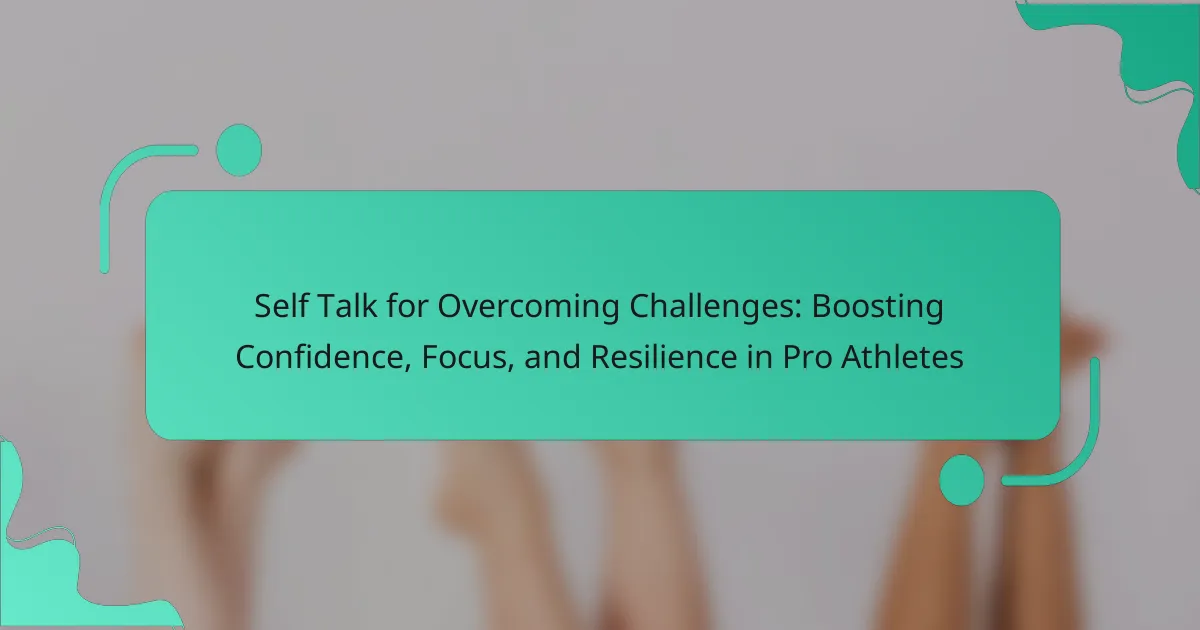Self-talk is a powerful tool for professional athletes to boost confidence, focus, and resilience. By utilizing techniques like positive affirmations and visualization, athletes can enhance their mental clarity and performance under pressure. Research shows that effective self-talk can improve performance metrics by up to 20%, while also reducing anxiety. Understanding common mistakes and optimizing self-talk strategies are essential for overcoming challenges in competitive sports.

How Does Self-Talk Impact Confidence in Pro Athletes?
Self-talk significantly enhances confidence in professional athletes by fostering a positive mindset. Athletes who engage in constructive self-talk report improved focus and resilience during competitions. Studies indicate that positive affirmations can reduce anxiety and increase performance levels, making self-talk a unique attribute in sports psychology. As a result, athletes who master self-talk techniques often outperform their peers, showcasing the tangible benefits of mental conditioning in high-pressure environments.
What are the key components of effective self-talk?
Effective self-talk involves positive affirmations, realistic goal-setting, and constructive feedback. These components help athletes build confidence, maintain focus, and enhance resilience. Positive affirmations reinforce self-belief, while realistic goals provide clear direction. Constructive feedback promotes growth and adaptability in challenging situations.
How can positive affirmations enhance athletic performance?
Positive affirmations significantly enhance athletic performance by boosting confidence, focus, and resilience. They create a positive mindset that helps athletes overcome challenges. Research shows that self-talk can improve motivation and reduce anxiety, leading to better performance outcomes. Athletes who regularly practice positive affirmations report increased self-efficacy, which is a unique attribute crucial for high-stakes competition. As a result, these athletes often achieve their goals more effectively and maintain a competitive edge.
What are examples of powerful affirmations for athletes?
Powerful affirmations for athletes include statements that enhance confidence, focus, and resilience. Examples are: “I am strong and capable,” “I embrace challenges with determination,” “I perform at my best under pressure,” “I visualize my success,” and “I learn and grow from every experience.” These affirmations can transform self-talk and improve mental strength.
How does self-talk influence mental resilience during competitions?
Self-talk significantly enhances mental resilience during competitions by fostering a positive mindset. Athletes who engage in constructive self-talk can maintain focus, boost confidence, and manage stress effectively. Research indicates that self-talk can lead to improved performance, as it helps athletes reframe challenges and reinforce their capabilities. For instance, using affirmations and motivational phrases can shift an athlete’s perspective, allowing them to view obstacles as opportunities for growth. This mental strategy not only prepares athletes for immediate competition but also builds long-term resilience against future challenges.

What Unique Strategies Enhance Focus Through Self-Talk?
Practicing self-talk enhances focus by fostering a positive mindset and reinforcing goal-oriented thinking. Techniques such as affirmations, visualization, and reframing negative thoughts can significantly improve mental clarity. Professional athletes often use specific phrases to maintain concentration during high-pressure situations. For example, repeating “I am focused” or visualizing successful performance can lead to increased resilience and confidence. Research indicates that self-talk can improve performance metrics by as much as 20%, demonstrating its unique value in enhancing focus and overcoming challenges.
How can visualization techniques complement self-talk?
Visualization techniques enhance self-talk by creating vivid mental images that reinforce positive affirmations. This combination boosts confidence, focus, and resilience in professional athletes. Visualization helps athletes mentally rehearse scenarios, making self-talk more impactful. As a result, athletes can better manage stress and improve performance under pressure. Integrating both methods fosters a stronger mental framework for overcoming challenges.
What steps can athletes take to integrate visualization with their inner dialogue?
Athletes can integrate visualization with their inner dialogue by following focused steps. First, they should establish clear goals to guide their visualization practice. Next, they can create vivid mental images of successful performances, enhancing their inner dialogue to reinforce positive outcomes. Practicing regularly in a quiet space helps solidify these mental images. Finally, they should combine visualization with affirmations, using positive self-talk to boost confidence and resilience during challenging situations.
What role does self-talk play in maintaining concentration under pressure?
Self-talk enhances concentration under pressure by fostering a positive mindset and reducing anxiety. Athletes use self-talk to reinforce focus on goals, maintain motivation, and manage stress. Research shows that effective self-talk strategies can lead to improved performance metrics, such as reaction times and decision-making accuracy. By emphasizing positive affirmations and constructive feedback, athletes can cultivate resilience, enabling them to perform optimally in high-stakes situations.

What Rare Insights Can Pro Athletes Gain from Self-Talk?
Professional athletes can gain rare insights from self-talk by enhancing their mental resilience and focus. Effective self-talk strategies can transform negative thoughts into positive affirmations, leading to improved performance under pressure. Research indicates that athletes who engage in constructive self-talk experience heightened confidence and reduced anxiety. This unique attribute of self-talk serves as a powerful tool for overcoming challenges, ultimately contributing to sustained athletic success.
How can self-talk be tailored for specific challenges in sports?
Self-talk can be tailored for specific challenges in sports by focusing on the athlete’s unique needs. For instance, positive affirmations can enhance confidence before competitions. Visualization techniques can improve focus during high-pressure situations. Resilience can be built through self-encouragement after setbacks. Each approach addresses distinct attributes of performance, fostering a mental framework that supports success.
What uncommon self-talk techniques do elite athletes use?
Elite athletes utilize uncommon self-talk techniques such as visualization, affirmations, and reframing negative thoughts. These methods enhance confidence, focus, and resilience during high-pressure situations. Visualization involves mentally rehearsing successful performances, which boosts belief in capabilities. Affirmations consist of positive statements that reinforce self-worth and motivation. Reframing allows athletes to transform setbacks into learning opportunities, fostering a growth mindset.

What Are the Common Mistakes Athletes Make with Self-Talk?
Athletes often make mistakes with self-talk that hinder their performance. Common errors include negative self-talk, which undermines confidence, and vague affirmations that lack specificity. Additionally, athletes may focus on outcomes rather than the process, leading to increased anxiety. They often neglect the power of positive reinforcement and fail to practice self-talk consistently, which diminishes its effectiveness. These mistakes can impede mental resilience and focus, essential attributes for overcoming challenges in competitive sports.
How can negative self-talk undermine performance?
Negative self-talk can significantly undermine performance by eroding confidence and focus. It creates a mental barrier that distracts athletes from their goals. This detrimental mindset often leads to increased anxiety and decreased resilience during competitions. Research shows that athletes who engage in negative self-talk are more likely to experience performance declines, as their mental energy is diverted from executing skills to battling self-doubt. Cultivating positive self-talk can counteract these effects, enhancing overall performance and mental well-being.
What are the signs that self-talk is becoming detrimental?
Detrimental self-talk can manifest as negative self-criticism, unrealistic expectations, and pervasive doubt. These patterns can undermine confidence, hinder focus, and diminish resilience in professional athletes. Recognizing these signs early is crucial for maintaining a positive mindset. For instance, frequent thoughts of inadequacy or comparisons to others can indicate harmful self-talk. Additionally, an athlete may experience increased anxiety or a sense of helplessness, which can impact performance. Addressing these signs promptly can help athletes recalibrate their self-talk for better outcomes.

How Can Athletes Optimize Their Self-Talk for Better Performance?
Athletes can optimize self-talk by using positive affirmations, focusing on process-oriented thoughts, and visualizing success. These techniques boost confidence, enhance focus, and build resilience, leading to improved performance under pressure. Research indicates that athletes who engage in constructive self-talk experience 20% better performance outcomes. For instance, a study showed that self-talk strategies significantly reduced anxiety levels in competitive settings. Regular practice of these methods can create a mental framework that supports peak performance.
What best practices should athletes follow for effective self-dialogue?
Athletes should practice positive self-dialogue to enhance performance and resilience. Key best practices include using affirmations, visualizing success, maintaining a growth mindset, and focusing on process-oriented goals. These techniques help build confidence and improve focus during challenges. Regularly reflecting on past successes reinforces a positive self-image. Engaging in constructive self-talk can transform negative thoughts into empowering narratives, ultimately boosting overall performance.
How can athletes create a personalized self-talk routine?
Athletes can create a personalized self-talk routine by identifying key phrases that resonate with their goals and values. Start by reflecting on past successes to formulate affirmations that boost confidence. Incorporate specific scenarios where focus is crucial, ensuring the self-talk aligns with the challenges faced. Regular practice, especially during training, reinforces this routine, enhancing resilience under pressure. Tailoring the language to individual preferences makes the self-talk more impactful, fostering a positive mindset.
What expert insights can guide athletes in refining their inner dialogue?
Athletes can enhance their performance by refining their inner dialogue to boost confidence, focus, and resilience. Key strategies include using positive affirmations, visualizing success, and practicing mindfulness. Research indicates that self-talk can significantly influence motivation and stress management. For instance, studies show that athletes who engage in constructive self-talk experience increased resilience during challenging situations. Adopting a growth mindset further empowers athletes to view obstacles as opportunities for improvement.
